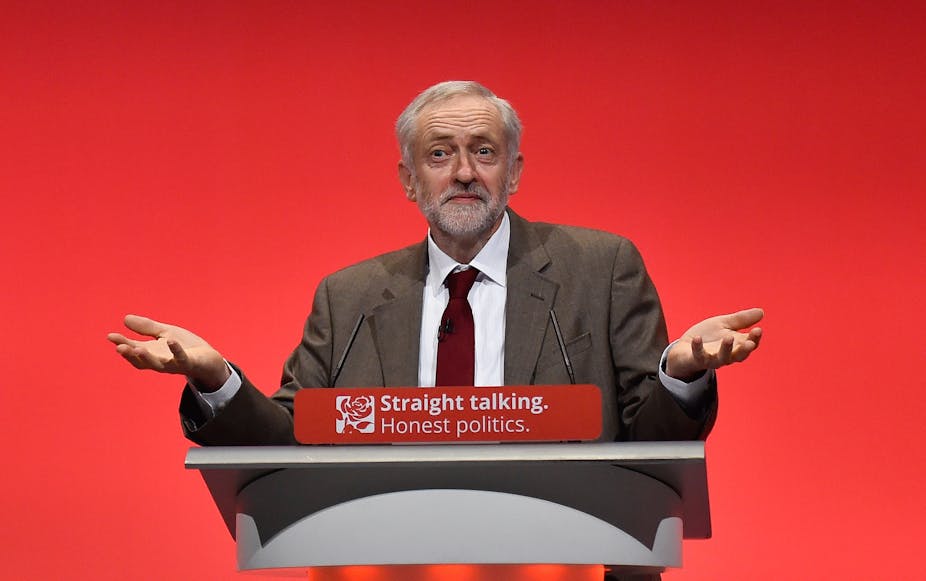Jeremy Corbyn is not a great orator. He has spent most of his career talking to the already persuaded from the backbenches. Nevertheless, his low-key and patently decent approach proved highly effective in the Labour leadership campaign. The test, then, for his first major speech as party leader was whether he could carry these qualities over into the high-stakes arena of the televised party conference.
Lengthy and rambling in places, there was a familiar mixture of personal modesty and ideological conviction that delighted delegates in the conference hall. What is less certain though, is whether Corbyn has done enough to convince the wider public.
My University of Bath colleague David Moon is an expert on the rhetoric of Labour Party leaders. He told me before the speech that tone rather than content would be key to understanding its impact. And he was right.
Corbyn spoke for almost an hour and covered a lot of ground – possibly too much. As predicted the tone was reassuring. Wearing a suit and tie and speaking through an autocue for the first time in his career, Corbyn started with some jokes at the expense of the media (guaranteed to go down well with the Labour grassroots).
Although he did get a bit shouty at some points, he worked hard to remain avuncular and unthreatening throughout. At times, he was almost boring.
Not unreasonably, given how little time he has had to stamp his mark on the Labour Party, Corbyn put a lot of emphasis on projecting values – in particular trying to elide Labour values with those of the wider public. “British values are internationalist and universal,” he declared, and when he said Labour was “bringing real values back into politics”, he was given a standing ovation in the hall.
Elsewhere he stated that the Labour Party is “at its best”, when it is “democratic, inclusive and growing”. He also tried to set out his stall in terms of foreign policy, criticising the Saudis, Bahrain, the US, and the UK government (although, interestingly, given some of the controversies that have surrounded him, not Israel). When he talked about the toxic legacy of the second Iraq war, there was also the sense that he was settling some old scores with the Blair government.
There were, however, some passages that revealed ideological substance and, in places, steel. In terms of party management, Corbyn made a point of reminding delegates of the more than 160,000 members who recently joined the party and in particular the 50,000 who have joined since he became leader. In doing so, he threw down the gauntlet to the Parliamentary Labour Party. There would be a number of policy reviews that would put off the day of reckoning but he made it clear that he had a mandate for change and they would not enjoy a veto on that change.

It is hard to see the PLP objecting to building more council houses, reversing cuts in tax credits and bringing the railway network back into full public ownership, but there are other issues that will be more difficult to resolve – particularly renewing Trident, an issue with the potential to split the Labour Party. For his part, Corbyn made it clear he thinks renewing the UK’s nuclear weapons system is “not the way forward”.
Beware misery
Corbyn’s speech had to address three distinct audiences. First, he had to provide enough ideological substance for the grassroots party faithful – particularly the “Corbynistas” who have flocked in over the past few months. Many of these people are deeply suspicious of the Labour Party’s establishment and they are primed to cry foul at the first sign of compromise on Corbyn’s relatively radical platform.
Second, Corbyn had to try to neutralise the discontents in the parliamentary party and to placate key backers still unconvinced that he will not only be a responsible steward of the party, but also win back millions of lost voters.
Third, and most problematic for Corbyn, he had to talk directly to the electorate, who see him as fresh and different but remain unconvinced about his qualities as a potential prime minister. And here lies the greatest trap: fresh and different can quickly become strange and dangerous for a risk-averse electorate.
Of the three audiences, Corbyn was most successful talking to his grassroots support. It seems he’s happy to stay in permanent campaign mode. He also engaged with the PLP and the Labour establishment, pushing contentious issues into the long grass via policy reviews and issuing a subtle threat to mobilise his mandate and appeal to “his” support base over the heads of party grandees.
However, I doubt he did much to define himself with the wider British public. In particular, there remains the danger that Corbyn’s Labour will lapse into what the Blairite commentator John McTernan calls “miserabilism”: that by concentrating on what is seen as Tory economic failure, the party’s message is increasingly out of step with the gut instincts of many voters.
For it is a difficult task for Labour to take this message to the swing seats Labour needs to win in 2020. There, voters’ personal experience is often that of an increasingly vibrant economy with rising living standards (albeit after many years of decline). If it wants to be competitive in 2020, Labour will need to craft a more positive message to reach out to these voters – and will have to come up with it sooner rather than later.

